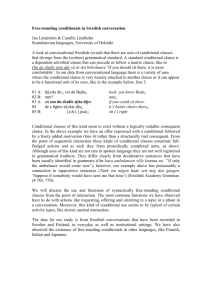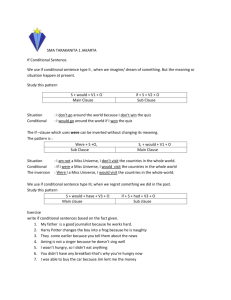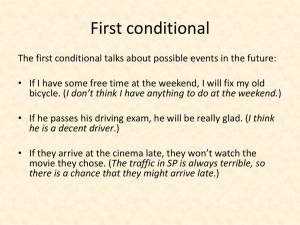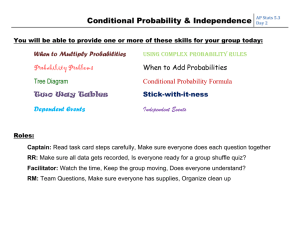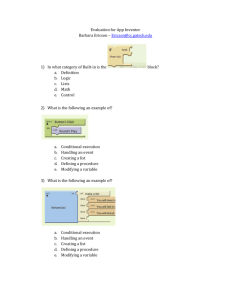Essay Writing
advertisement
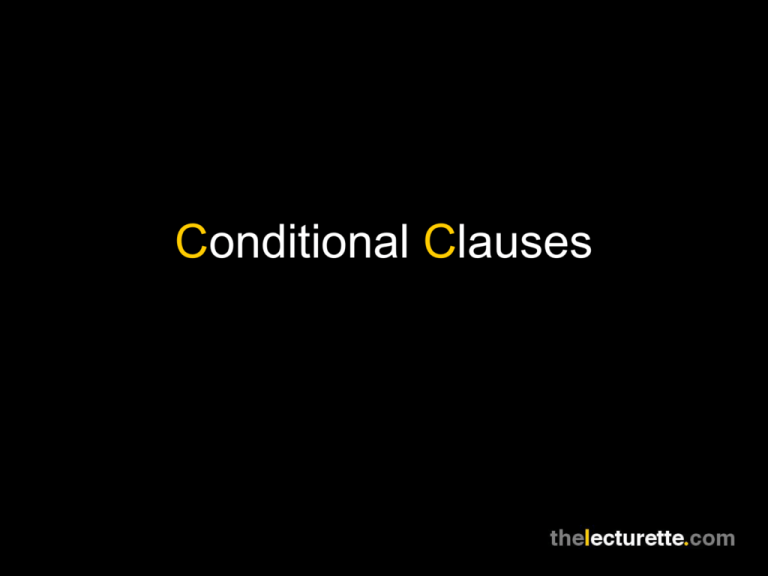
Conditional Clauses Conditional Clauses • You use a conditional clause to talk about a possible situation and its results. • Conditional clauses often begin with ‘if’. • To make a complete sentence, a conditional clause needs a main clause. • A conditional clause can come before or after a main clause. Conditional Clauses • A conditional clause is used to talk about a situation that might happen and its possible results. • ‘If’ is used to talk about events that: – happen often – may happen in the future – could have happened in the past but didn’t happen – will probably not happen Conditional Clauses • Examples – If the light is red, the battery is probably empty. (This happens often.) – I’ll phone you if I need you. (This may happen in the future.) – If I had known, I’d have told you. (This could have happened, but it didn’t) – If she phoned me, I’d come immediately. (This will probably not happen.) Conditional Clauses • When something is generally true or happens often the present tense or the present perfect tense is used in the main clause and also in the conditional clause. – If you lose weight too quickly, you soon regain it. – If a driver does not own a license, he is breaking the law. – If we have won the lottery, they tell us. – If the red light is blinking, the gas tank is probably empty. Conditional Clauses • Note: You do not use the present continuous in both clauses. You don’t say ‘If they are losing money, they are getting angry.’ Conditional Clauses • When a conditional clause is used with a present or a present perfect tense, an imperative is used in the main clause. – Call me if you’re worried. – If he has finished, ask him to leave quietly – If you are very early, don’t expect them to be ready. Conditional Clauses • When talking about something that may happen in the future, a present or a present perfect tense is used in the conditional clause and a simple future in the main clause. – If you marry her, you will need money. – If you are going to America, you will need a Visa. – If he has washed the windows, he will want his money. Conditional Clauses • Note: You do not use ‘will’ in conditional clauses. You do not say ‘If I will see you tomorrow, I will give you the book.’ Conditional Clauses • When talking about something that is unlikely to happen, the past simple or the past continuous is used in the conditional clause an ‘would’ in the main clause. – If I had enough money, I would buy a car. – If he was coming, I would call. Conditional Clauses • Note: You do not use ‘would’ in a conditional clause. You do not say ‘If I would do it, I would do it like this.’ Conditional Clauses • ‘Were’ is sometimes used instead of ‘was’ in the conditional clause, especially after ‘I’. – If I were as big as you, I would kill you. – If I weren’t to busy, I would do it for you. • You often say ‘If I were you’ when you are giving advice to someone. – If I were you, I would take the money. – I should keep out of her way, if I were you. Conditional Clauses • When talking about something which could have happened in the past but which did not actually happen, you use the past perfect in the conditional clause. You use ‘would have’ and a past participle in the main clause. – If he had realized that, I he would have run away. – I wouldn’t have been so depressed, if I had known how common this feeling is. Conditional Clauses • Note: You do not use ‘would have’ in the conditional clause. You do not say ‘If I would have seen him, I would have told him’. Questions? For more slide presentations visit:

